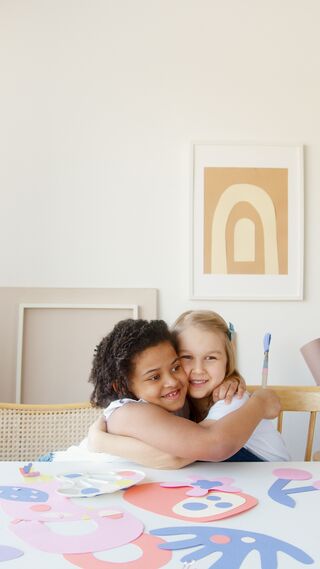Attention
Why Knowing More Words Helps Kids Succeed
A new study shows that vocabulary helps kids make friends, learn, and engage.
Posted August 20, 2022 Reviewed by Vanessa Lancaster
Key points
- A recent study shows attention and vocabulary matter for school success in different ways.
- When children know more words, they tend to have an easier time socializing.
- Conversations with young children can help them learn new words and build attentional strategies.

Imagine two different scenarios in the same preschool classroom:
- One child, Sandy, is sitting restlessly on her chair at circle time. Then she starts flinging blocks around the room.
- Another child, Bobbie, sits quietly and listens as the teacher talks. She hears more words from the teacher, and she can better respond.
Bobbie is better able to pay attention—and, new research shows, this ability to pay attention may help her engage with her classmates and teachers.
Having a strong vocabulary can also help. As a study published in August 2022 in Early Education and Development found, preschool children who started with higher levels of vocabulary and better “inhibitory control,” or the ability to suppress an initial reaction and choose another—for example, to raise a hand rather than shout out—were more engaged with teachers and peers.
Kids Who Know More Words Can Socialize More Easily
As a speech-language pathologist who has worked with young children, I have often seen a cycle in action: Children who know more words and can express themselves better tend to better get their needs met. This lets them feel better about others and allows others to feel better about them.
They’re also often more able to pay attention since the words around them are more meaningful. In contrast, children who aren’t able to pay attention as well and/or don’t have as strong vocabularies tend to struggle more to get what they want and need. When frustrated, they may act out—and this can cause teachers and classmates to punish or shun them. With such feedback, they may get further isolated and lose out on opportunities to develop the very skills they’re missing.
We don’t always consider vocabulary skills to be related to how engaged a child is in school. But interesting research has shown that children who have bigger vocabularies when they enter school are more likely to develop strong relationships with teachers. They also tend to receive more positive feedback from peers.1

Language is Social in the Early Years
This makes sense when considering that language is social, especially in the early years. We often think about kids using language to label things—for example, “truck,” “tree,” or “doll.”
But so much of language has to do with navigating relationships. If you can tell your friend, “I’m sorry,” when you’ve done something that might have hurt them, or ask, “Are you scared?” when a friend has started crying, you have a powerful key to making social connections. But if you can’t do that, you may act out in various ways.
If you interrupt a teacher, they may give you negative feedback that affects how your classmates perceive you. It also may affect how you perceive yourself, in a cycle that boomerangs back.
In this way, we can see children’s talk and interactions with the environment as a two-way street. As the authors of the 2022 study found, “Children’s own skills at the start of the year shape the process of their approaching teachers, peers, and tasks as well as their classroom environment is responding to them.” Vocabulary and attention might shape behavior in two different ways.
They suggest that vocabulary matters more for having positive engagement with classmates and teachers. “Inhibitory control,” or the ability to stop yourself from your initial impulses, may matter more for being engaged mentally with tasks and having fewer disruptive behaviors.
Think about a child who is better able not to call out an answer when the teacher asks for raised hands versus a child who simply shouts out. The child who shouts out may get a warning rather than the chance to say what they think. They’ll also be less likely to be liked by their classmates. Or think about a child who wants to hit another child but who's able to stop herself before doing so.
Soon, labels like "attentive child” and “troublemaker” form—and these can have surprisingly long-lasting consequences. Many teenagers having trouble in class have told me they remember getting labels like these early on, and they often played into those labels. If a child feels he's a "troublemaker," he's more likely to act like one–and then he gets treated like one, in a spiral that builds. The opposite, or the positive spiral, is also true.
Conversations Can Help Kids With Attention and Vocabulary
With all this in mind, it’s worth considering the conversations that can help kids build their vocabulary and pay attention well. It can help to start with open-ended questions—for example, “why” and “how” questions that let kids get more words out and make more complex sentences.
It’s also helpful, even with young kids, to discuss strategies that work well and less well for them to pay attention. Maybe a bouncy chair would help one child, while a fidget would help another. Even young kids can get engaged in the process of being curious about their own attention—and learning how to help themselves.
For more strategies to support learning, see my book, The Art of Talking with Children.
References
[1] Cadima, J., Barros, S., Ferreira, T., Serra-Lemos, M., Leal, T., & Verschueren, K. (2019). Bidirectional associations between vocabulary and self-regulation in preschool and their interplay with teacher–child closeness and autonomy support. Early Childhood Research Quarterly, 46, 75–86. https://doi.org/10.1016/j.ecresq.2018.04.004
Rolland. (2022). The Art of Talking With Children. www.amazon.com/Art-Talking-Children-Creativity-Confidence/dp/0062938886…




